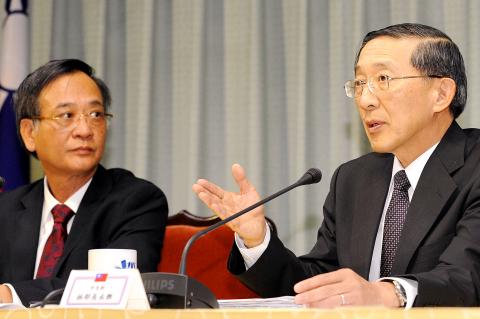Vietnamese Representative to Taiwan Bui Trong Van yesterday sought to reassure Taiwanese that the Southeast Asian country remains a safe investment and tourist destination, and called on the local media not to exaggerate reports about the recent unrest, saying it has sparked panic and could damage relations between Hanoi and Taipei.
“Repeated TV broadcasts of the protests have caused large-scale panic among people here in Taiwan. I hope everyone can refrain from exaggerating the situation because that cannot help us work together to get through the difficulty facing us,” Bui said in Mandarin at a press conference at the Ministry of Foreign Affairs.
Bui said he felt regret and apologized for the damage and financial losses that Taiwanese businesses had suffered because of the work of some “lawbreakers and evildoers” during the protests earlier this week in Vietnam.

Photo: Chen Chih-chu, Taipei Times
The protests were held in the wake of China’s deployment of an oil rig in waters close to the Paracel Islands (Xisha Islands, 西沙群島), which are claimed by Taiwan, Vietnam and China. The demonstrations turned violent and many businesses owned by investors from Taiwan, China, Singapore, Japan and South Korea were attacked, looted and destroyed.
More than 1,000 people involved “in the violent and illegal actions” were arrested, which shows the Hanoi government’s determination to enforce the law, Bui said.
The Vietnamese government has promised that those who have broken the law will be charged and severely punished, and that it will “take a responsible attitude in dealing with compensation claims” by Taiwanese investors, he said.
“We have done our best and implemented the necessary measures to restore order and, we will continue to react to illegal actions in this way in the future,” he said, alluding to calls in Vietnam for a nationwide protest tomorrow.
The extent of damage caused to properties owned by Taiwanese investors was more serious compared with investors from other countries, but it was not because Taiwanese-owned firms were the target of the protesters, Bui said.
Asked why Taiwanese-owned businesses were attacked, he said: “It’s not because they [the protesters] could not distinguish between Taiwan and China, but that they were instigated [by some groups] and they acted in an irrational manner. There are lawbreakers in every society. They were not specifically targeting Taiwanese.”
Vietnamese are peace-loving people and are friendly toward Taiwan, Bui said.
“There are about 220,000 Vietnamese in Taiwan, married to Taiwanese, new immigrants, workers and college students. They love to work, study and live here,” he said.
Taiwan is the fourth-largest source of foreign direct investment in Vietnam, with total investments over the past 20 years reaching US$28 billion, while bilateral trade totaled US$12 billion, Bui said.
He refuted the allegation that the Vietnamese government had connived with its people to engage in violent behavior.
The government will assist businesses affected by the protests, help them resume operations as soon as possible and ensure peace and order in the country, he added.

CHAOS: Iranians took to the streets playing celebratory music after reports of Khamenei’s death on Saturday, while mourners also gathered in Tehran yesterday Iranian Supreme Leader Ayatollah Ali Khamenei was killed in a major attack on Iran launched by Israel and the US, throwing the future of the Islamic republic into doubt and raising the risk of regional instability. Iranian state television and the state-run IRNA news agency announced the 86-year-old’s death early yesterday. US President Donald Trump said it gave Iranians their “greatest chance” to “take back” their country. The announcements came after a joint US and Israeli aerial bombardment that targeted Iranian military and governmental sites. Trump said the “heavy and pinpoint bombing” would continue through the week or as long

TRUST: The KMT said it respected the US’ timing and considerations, and hoped it would continue to honor its commitments to helping Taiwan bolster its defenses and deterrence US President Donald Trump is delaying a multibillion-dollar arms sale to Taiwan to ensure his visit to Beijing is successful, a New York Times report said. The weapons sales package has stalled in the US Department of State, the report said, citing US officials it did not identify. The White House has told agencies not to push forward ahead of Trump’s meeting with Chinese President Xi Jinping (習近平), it said. The two last month held a phone call to discuss trade and geopolitical flashpoints ahead of the summit. Xi raised the Taiwan issue and urged the US to handle arms sales to

State-run CPC Corp, Taiwan (CPC, 台灣中油) yesterday said that it had confirmed on Saturday night with its liquefied natural gas (LNG) and crude oil suppliers that shipments are proceeding as scheduled and that domestic supplies remain unaffected. The CPC yesterday announced the gasoline and diesel prices will rise by NT$0.2 and NT$0.4 per liter, respectively, starting Monday, citing Middle East tensions and blizzards in the eastern United States. CPC also iterated it has been reducing the proportion of crude oil imports from the Middle East and diversifying its supply sources in the past few years in response to geopolitical risks, expanding

An Emirates flight from Dubai arrived at Taiwan Taoyuan International Airport yesterday afternoon, the first service of the airline since the US and Israel launched strikes against Iran on Saturday. Flight EK366 took off from the United Arab Emirates (UAE) at 3:51am yesterday and landed at 4:02pm before taxiing to the airport’s D6 gate at Terminal 2 at 4:08pm, data from the airport and FlightAware, a global flight tracking site, showed. Of the 501 passengers on the flight, 275 were Taiwanese, including 96 group tour travelers, the data showed. Tourism Administration Deputy Director-General Huang He-ting (黃荷婷) greeted Taiwanese passengers at the airport and